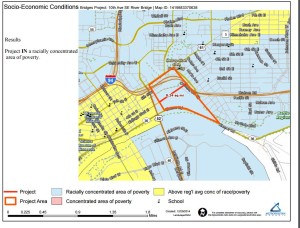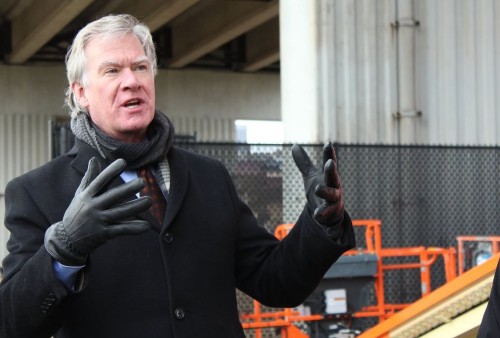
Less than 18 months ago, St. Paul city planners estimated the cost to fix the Kellogg Boulevard-Third St. Bridge at $8 million. The estimated cost to taxpayers to replace the entire bridge was said to be $40 million. Today the city’s requesting that Minnesota taxpayers borrow $52 million for the project which will add dedicated bus lanes, bike lanes, and room for future light rail. Rather than pony up the $8 million to fix a bridge– which can be fixed– the sanctuary city of St. Paul will stick federal and state taxpayers with the bill. St. Paul’s already received over $9,275,000 in funding for the project from other tax revenue streams.
The current 0.4 mile bridge, that runs along the Mississippi and connects downtown St. Paul to Mounds Boulevard on the east side, was built in 1982. While the most recent traffic counts from the Minnesota Department of Transportation indicate an average daily traffic of 9,900 vehicles per day, the City stated in their bonding request a “two day traffic count at the bridge that resulted in a present ADT of 14,200.”
City inspectors found structural deficiencies in the summer of 2014, reported The Pioneer Press:
Cracks found along the bridge’s cantilevers — the support arms extending from the structure’s piers — along with changes to federal bridge codes are prompting the shift, City Engineer John Maczko said.
“The cracking is something we have been monitoring for awhile but we weren’t too concerned about,” Maczko said.
But when the city found money in its budget to initiate pre-design work to repair the bridge, staff came across the new federal specifications, Maczko added.
At the time, the cost-estimate to fix the bridge was about $8 million, but the city decided to replace the bridge instead. St. Paul’s already been awarded over $9 million in tax dollars via Regional Federal Road and Bridge funds and State Bridge Bonds, according to the bonding request.
The project’s scope includes upgraded bicycle and pedestrian facilities and capacity for the proposed Gold Line/Gateway Corridor bus rapid transit line to Woodbury. The bonding request also includes a brief mention of the still-in-planning 80-mile Rush Line Corridor which will go from downtown St. Paul through Forest Lake to Hinckley yet indicates a “mode of transit and a route have not yet been selected” for that line.
But the Met Council’s planning document for the Kellogg-Third St. bridge states: “Reconstruction is the City preferred alternative as this would allow for upgraded bicycle and pedestrian facilities as well as accommodating Gateway bus rapid transit (BRT), Rushline and Red rock transit ways, and future LRT.” Although LRT along the bridge has never received any sort of approval from elected officials, The Met Council spells out the plans for the future Kellogg-Third St. bridge, “The area currently set aside for dedicated BRT lanes would be designed to allow for future conversion to LRT.” From The Pioneer Press:
“Right now, the bridge carries cars. It doesn’t do a good job of carrying pedestrians or bicyclists … and it doesn’t have anything for bus rapid transit,” Mazcko said. “So it would really be remiss to, in my opinion, just spend $8 million to address part of the problem when you could … address all of them for today and in to the future.”
The bridge has also been identified under the St. Paul Bicycle plan-as a “major bikeway” and a link from “critical low-income, minority neighborhoods to growing employment centers.”

But bike advocates are unhappy with the inflated cost to taxpayers, believing their aims could be accomplished for less money and calling out “infrastructure opportunists” for unnecessarily expanding the scope of the project. Matt Steele at streets.mn was immediately upset by the plan to keep four traffic lanes on the bridge calling the existing bridge “hostile to those who walk or bike across it” and arguing in MinnPost that “The obvious solution is to repair the existing bridge in a way that accommodates existing traffic, welcomes new walkers and bikers, and prepares the way for future transit service — for about 75% less than a new bridge.”
The project has big boosters like St. Paul Mayor Chris Coleman– who has launched a $15 million “Rebuild St. Paul” campaign to promote jobs in the lagging twin city– and Matt Kramer, President of the St. Paul Area Chamber of Commerce. Both testified before the State Senate last spring in support of a–then– $40 million bonding request for the project (SF 1234)
The Gateway Corridor commission, which oversees the $485 million 12-mile dedicated bus roadway from downtown St. Paul to Woodbury, passed a resolution of support for replacing the bridge in June. The move could help St. Paul secure a federal Transportation Investment Generating Economic Recovery (TIGER) grant. Of the eighteen members on the Gateway Corridor commission, only six showed up to vote at the June 11 meeting, all voting in favor of the resolution.
The $52 million bonding price tag is yet another hidden cost in the multi-billion-dollar metro-wide light rail plan pushed by Democrats, yet also fits the “roads and bridges” chant of Republicans, which could mean easy-sailing though the legislature when they reconvene to look at bonding requests in March.











